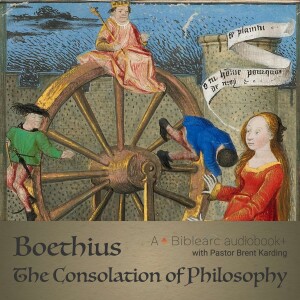
Chapter Summary
Boethius is still bothered by the contradiction he sees between Philosophy’s teaching on God’s foreknowledge of all things and on the existence of free will. If God accurately foresees every event, what he foresees will infallibly happen, which means man cannot have free will. Some argue that the inevitability of an action causes God’s foreknowledge. But those events are still necessary, and thus, in either case, free will is impossible. Also, if God’s decrees are that events may or may not happen, what kind of foreknowledge is that? But if his foreknowledge is certain, where is human freedom?
The moral result is catastrophic: Good cannot be truly rewarded, or evil punished, because people acted out of necessity, not their own choice. Virtue and vice would cease to exist. Further, vice would be attributed to God, since he is the cause of all things.
The practical result is destructive: Hope and prayer are both pointless. And since prayer is the only interaction people can have with God, we would thus be unable to be joined to him, cut off from our source of life.
About The Consolation of Philosophy
Written in the 6th-century from a prison cell as the author awaits execution for a crime he did not commit, The Consolation of Philosophy is a dialogue between Boethius and a mysterious woman—Lady Philosophy—who helps him rediscover wisdom and virtue.
Subscribe now and begin walking the path of wisdom with us.
 Want to go deeper?
Want to go deeper?
You’re invited to join the companion course that dives deep into each of the five books. There, we’ll explore each chapter, with guided readings, discussion prompts, and study tools to enrich your journey. Enroll today.
No comments yet. Be the first to say something!